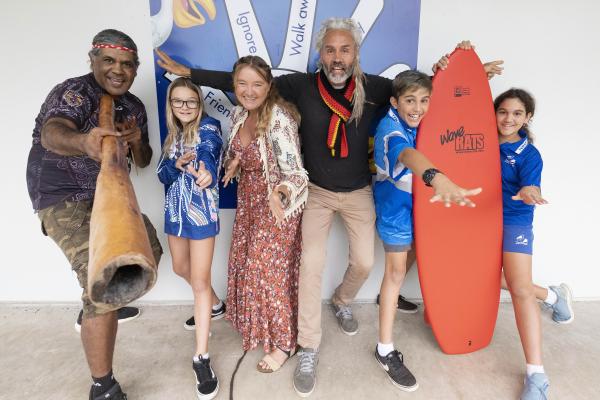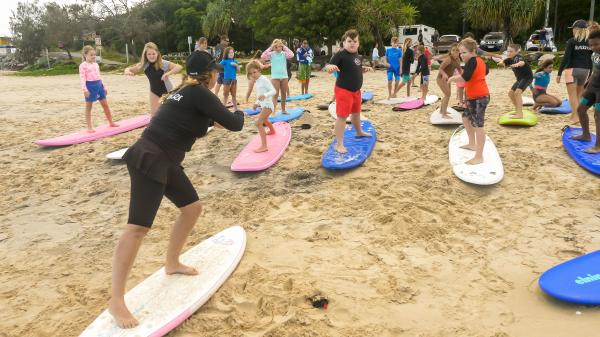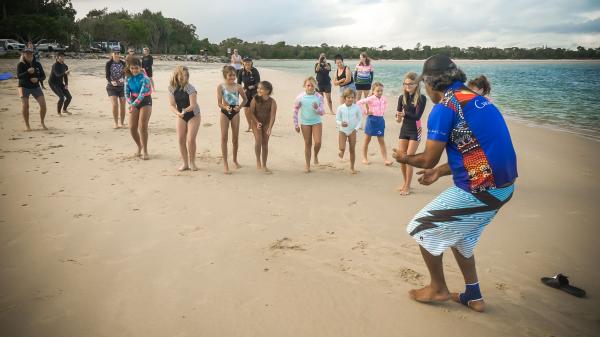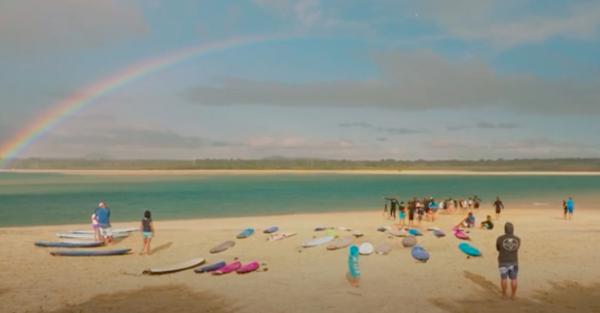
By Phil Jarratt
A couple of weeks ago, while interviewing young Noosa surfing brothers Kaiden and Landen Smales for Noosa Today, I was fascinated by the excitement they expressed when discussing a newfound connection with the Kabi Kabi First Nation through a program called Dingira Warrai (dancing on waves).
Kaiden said: “It was just awesome to meet people like Kabi Kabi man Lyndon Davis, who is a good person to learn the stories from. Every time he came to our coaching sessions he made such a great connection to the land and the ocean. He was telling us the story of how Noosa Head was made, and suddenly this amazing rainbow appears while he’s dancing around. It was magical. But just being able to teach the kids how to surf and see the smile on their faces was magical too.”
In an age when so many teenagers seem to live their lives with headphones on, it was just wonderful to see a couple of them so engaged. Last week I got to share their excitement again, along with an assembly hall full of enthusiastic kids, when, as a celebration of Mabo Day, Tewantin State School hosted the premiere of short film The Dingira Warrai Story, which explains the connections between surfing, Indigenous culture, wellness and mental health.
It’s a complex idea but its realization is refreshingly simple. Take a bunch of kids to the beach, teach them about connections to land and sea, show them how to dance on both, teach them life skills to get them through tough times.
The surfing part of the program came from Kristy Quirk, whose Surf Dancer Academy has been teaching surfing and wave dancing for 18 years. She says: “What’s so great about this program is that we got to experience it through Indigenous dance and storytelling, with all that significance of connection to country and the ocean. We got to express that by dancing not on the land but on the ocean. I’ve spent a lot of time in Byron Bay, living with the Arakwal people, where there was always a lot of talk about the dolphin/eagle spirit, and that’s where this particular dance idea came from, with the dolphins dancing on the waves and the eagles dancing above the ocean.
“I’ve also always had this passion for learning about Aboriginal culture and their way of doing things. It’s so important for all of us to keep that connection to country, for our own wellbeing and mental health. And with such a depth of culture, it’s a beautiful way to introduce people to surfing.”
Youturn Youth Support engagement manager Susan Beaton explained that the initial seven-week Dingira Warrai program, which ran through first term this year, was developed following Tewantin Dental Centre – part of Bupa’s Dental Network – applying for a grant to deliver a wellbeing program aimed at building resilience in children. The funding was awarded through Bupa’s Community Grants, enabling Youturn to deliver a pilot program for 30 local children and some parents.
Says Susan: “The events of 2020 brought many of us back to our local neighbourhoods – coming together to talk things over, taking time for family, sharing knowledge, stories and skills – highlighting the strength in traditional First Nations ways of doing things. These perspectives are key to the oldest surviving culture on earth, and became our inspiration. Partners Gubbi Gubbi Dance and Surf Dancer Academy were the perfect collaborators to deliver our program vision, and we are extremely grateful to Tewantin Dental Centre for gifting local children this experience.”
The Dingira Warrai program aims to embed traditional knowledge and skills to tackle adversity, or issues such as feeling anxious, down or under pressure. Its unique mix of elements has participants and supporters, including Rick Cass, deputy principal of Tewantin State School, excited about Dingira Warrai’s potential. Mr Cass said: “Our children who identify as either Aboriginal or Torres Strait Islander heritage are thrilled to be given this unique and fun learning opportunity – using an outdoor classroom in the early morning as a place and time to promote wellbeing is magic.”








